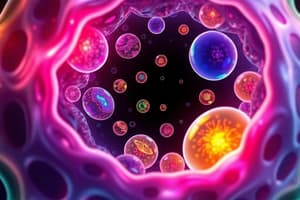Podcast
Questions and Answers
Which branch of biology focuses specifically on the study of microorganisms?
Which branch of biology focuses specifically on the study of microorganisms?
- Ecology
- Botany
- Zoology
- Microbiology (correct)
What is the main focus of genetics in biology?
What is the main focus of genetics in biology?
- Heredity and variation (correct)
- Behavior of animals
- Interdependence of species
- Plant physiology
Which of the following statements reflects the concept of homeostasis?
Which of the following statements reflects the concept of homeostasis?
- Cells are the basic unit of life.
- Organisms evolve through natural selection.
- An organism's internal conditions remain stable despite external changes. (correct)
- Photosynthesis converts light energy into chemical energy.
What is the role of ATP in cellular respiration?
What is the role of ATP in cellular respiration?
What process do plants use to convert light energy into chemical energy?
What process do plants use to convert light energy into chemical energy?
Which of the following is NOT one of the domains in biological classification?
Which of the following is NOT one of the domains in biological classification?
Who proposed the theory of evolution and what does it explain?
Who proposed the theory of evolution and what does it explain?
Which molecule is primarily responsible for carrying genetic information?
Which molecule is primarily responsible for carrying genetic information?
What is metabolism in the context of biology?
What is metabolism in the context of biology?
What is the primary function of carbohydrates in living organisms?
What is the primary function of carbohydrates in living organisms?
Flashcards are hidden until you start studying
Study Notes
Overview of Biology
- Definition: Study of life and living organisms, encompassing their structure, function, growth, evolution, and distribution.
Branches of Biology
- Botany: Study of plants, including their physiology, structure, and ecology.
- Zoology: Study of animals and their behavior, physiology, and genetics.
- Microbiology: Study of microorganisms, including bacteria, viruses, fungi, and protozoa.
- Genetics: Study of heredity and variation in organisms, focusing on genes and DNA.
- Ecology: Study of interactions between organisms and their environment.
- Evolutionary Biology: Study of the processes that drive the diversity of life through evolution.
Fundamental Concepts
- Cell Theory: All living organisms are composed of cells, and all cells arise from pre-existing cells.
- Homeostasis: The ability of an organism to maintain stable internal conditions despite external changes.
- Metabolism: The sum of all chemical reactions within an organism, including anabolism and catabolism.
Biological Classification
- Taxonomy: Classification of organisms based on shared characteristics.
- Domains: Archaea, Bacteria, Eukarya.
- Kingdoms: Animalia, Plantae, Fungi, Protista, Archaea, Bacteria.
Genetic Material
- DNA (Deoxyribonucleic Acid): The molecule that carries genetic information in cells.
- RNA (Ribonucleic Acid): Involved in protein synthesis and gene regulation.
- Chromosomes: Structures within cells that contain DNA and associated proteins.
Evolution and Natural Selection
- Theory of Evolution: Proposed by Charles Darwin; explains how species change over time through adaptation and natural selection.
- Natural Selection: Process by which organisms better adapted to their environment tend to survive and reproduce.
Biological Processes
- Photosynthesis: Process by which plants, algae, and some bacteria convert light energy into chemical energy.
- Cellular Respiration: Process by which cells convert glucose and oxygen into energy (ATP), water, and carbon dioxide.
Important Biological Molecules
- Proteins: Made of amino acids; essential for structure, function, and regulation of the body’s tissues and organs.
- Lipids: Fats and oils; important for energy storage, cell membrane structure, and signaling.
- Carbohydrates: Sugars and starches; primary source of energy for living organisms.
Ecosystems and Biodiversity
- Ecosystem: A community of living organisms along with their physical environment.
- Biodiversity: The variety of life in a particular habitat or ecosystem, crucial for ecosystem resilience and health.
Human Biology
- Anatomy: Study of the structure of the human body.
- Physiology: Study of the functions and processes of the human body systems.
Current Trends in Biology
- Biotechnology: Use of living systems and organisms to develop products.
- Genomics: Study of genomes, the complete set of DNA within an organism.
- Conservation Biology: Focus on protecting and preserving biodiversity and natural resources.
Overview of Biology
- Definition encompasses the study of life, including structure, function, growth, evolution, and distribution of living organisms.
Branches of Biology
- Botany: Focuses on plant physiology, structure, and ecology.
- Zoology: Examines animal behavior, physiology, and genetics.
- Microbiology: Investigates microorganisms such as bacteria, viruses, fungi, and protozoa.
- Genetics: Explores heredity, variation in organisms, and the role of genes and DNA.
- Ecology: Analyzes the interactions between organisms and their environment.
- Evolutionary Biology: Studies the processes that lead to the diversity of life through evolutionary changes.
Fundamental Concepts
- Cell Theory: Asserts that all living organisms are composed of cells, which arise from pre-existing cells.
- Homeostasis: Refers to an organism's capability to maintain stable internal conditions despite external changes.
- Metabolism: The collective term for all chemical reactions in an organism, including anabolism (building up) and catabolism (breaking down).
Biological Classification
- Taxonomy: The systematic classification of organisms based on shared characteristics.
- Domains: Three main categories—Archaea, Bacteria, and Eukarya.
- Kingdoms: Diverse groups including Animalia, Plantae, Fungi, Protista, Archaea, and Bacteria.
Genetic Material
- DNA (Deoxyribonucleic Acid): The molecule responsible for carrying genetic information in cells.
- RNA (Ribonucleic Acid): Plays a crucial role in protein synthesis and the regulation of genes.
- Chromosomes: Structures containing DNA and associated proteins located within cells.
Evolution and Natural Selection
- Theory of Evolution: Developed by Charles Darwin, explaining species' change over time through adaptation and natural selection.
- Natural Selection: The mechanism through which organisms that are better adapted to their environment survive and reproduce more effectively.
Biological Processes
- Photosynthesis: The process where plants, algae, and some bacteria convert light energy into chemical energy.
- Cellular Respiration: The conversion of glucose and oxygen into energy (ATP), water, and carbon dioxide in cells.
Important Biological Molecules
- Proteins: Composed of amino acids; vital for the structure, function, and regulation of bodily tissues and organs.
- Lipids: Involve fats and oils; crucial for energy storage, cell membrane integrity, and signaling between cells.
- Carbohydrates: Include sugars and starches; serve as the primary energy source for living organisms.
Ecosystems and Biodiversity
- Ecosystem: A synergistic community of living organisms alongside their physical environment.
- Biodiversity: Represents the variety of life in specific habitats, essential for the resilience and health of ecosystems.
Human Biology
- Anatomy: The study of human body structure.
- Physiology: The exploration of functions and processes of the body's systems.
Current Trends in Biology
- Biotechnology: The use of biological systems and organisms to create products.
- Genomics: Involves studying entire genomes—the complete DNA set within organisms.
- Conservation Biology: Concentrates on the protection and preservation of biodiversity and natural resources.
Studying That Suits You
Use AI to generate personalized quizzes and flashcards to suit your learning preferences.




